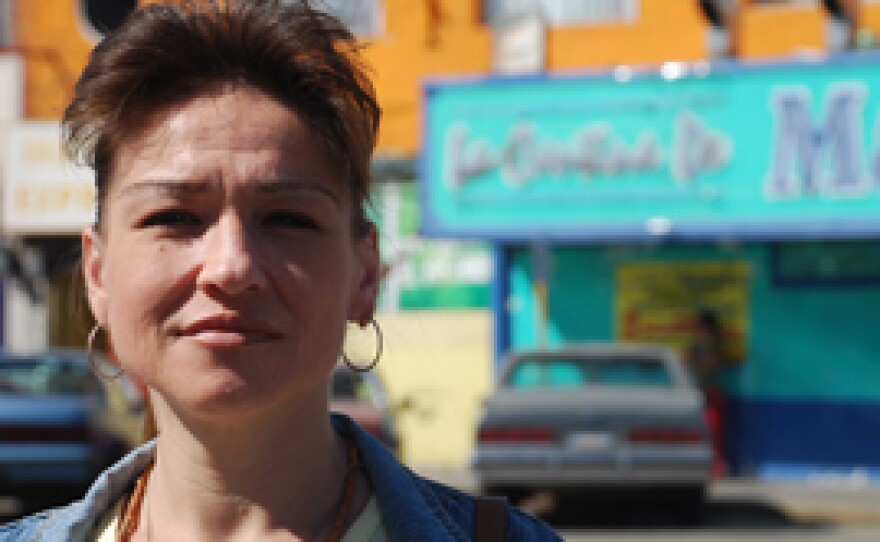(Photo: 'Melissa' on the street in downtown Tijuana. Kenny Goldberg/KPBS .)
Tijuana is a popular destination for American sex tourists. That’s because female sex workers are plentiful, and their services are cheap. But a new study from UCSD’s Division of International Health reveals these transactions may be risky for all concerned. KPBS Health Reporter Kenny Goldberg has the story.
You can buy almost anything on Avenida Revolucion in downtown Tijuana, including sex.
That’s what brings Joe down from Los Angeles once a month. He says the women are terrific, and the price is right.
Joe : Well normally it’s a twenty dollar, 25 or 30 dollars for an hour, maybe two hours. That’s the reason that we do come around. And it’s not just myself, there’s many other people that do come around for the same reason.
What makes you say that?
Because I’ve talked to several people that you know, they give me the same answer, and it’s about the same price. So we take advantage of it.
One of the women Joe takes advantage of is Melissa.
Melissa : Yes, I work right here down the street, all the way to Coahuila. Every day, all night, 24 hours, ’til I make enough money to get me by.
Melissa is a brunette of medium height, with a prominent tattoo just below her neckline. She’s been selling herself on the street for two years. She has a drug habit, and a young child to support.
Melissa says she does a lot of business with Americans. The only problem is, they often want her to take risks.
Melissa : Where I, worry the most is the ones where they, that they don’t want to wear a condom. Gosh, um, if they don’t wear a condom with me, and they refuse to wear one, that means they don’t wear one with anybody. So I’m pretty much at risk with those, and I’m aware of that. You’re aware of it, and yet you do it anyway, and that’s because? I need money.
A new study from UCSD 's Division of International Health reveals Melissa’s behavior is not unusual.
The study shows female sex workers who have American clients have a higher risk profile than those who don’t.
Researchers surveyed more than 470 women in Tijuana’s sex industry. Those who serviced Americans tended to be younger and tended to speak English. They were also more likely to have syphilis, gonorrhea, and HIV.
UCSD’s Dr. Steffanie Strathdee directed the study.
Strathdee : I think what we’re seeing is that there’s a confluence of factors that go together, that the women who have sex with American clients, are also the ones who are more likely to inject drugs, and they’re also the ones who are more likely to have a larger number of clients. They are the ones who are also, unfortunately, more likely to be having unprotected sex for a higher price.
And Strathdee says that’s a recipe for an epidemic.
The HIV rate among female sex workers in Tijuana has risen over the last decade to eight percent. Women in the business who also shoot drugs have an infection rate of around 15 percent.
Dr. Romedios Lozada is the coordinator of HIV programs for the state of Baja California.
Lozada believes it’s important not to single out sex workers.
Lozada : The sex worker has a responsibility to wear condoms. But each person has their own personal risk behavior, and we can’t assume that only ones who are transmitting infections are the sex workers. It’s also the clients who practice risky behaviors, and put the sex workers at risk of infection. So, it’s a shared risk.
Joe from Los Angeles says he tries to be careful. But he admits he doesn’t always wear a condom.
Joe : Well, it depends how long do I know the female. If I know her, you know, to think that, you know, I don’t have to protect myself, then I won’t use it.
UCSD’s Steffanie Strathdee says it’s obviously a bi-national problem.
Strathdee : We need to put the onus of responsibility for education not just on Mexico, but the United States really has a responsibility to try to promote education, as well.
Women who work the streets of downtown Tijuana are required to register with local authorities. They’re supposed to be tested every month for sexually transmitted diseases, too.
Of course, there are no such requirements for clients.
Kenny Goldberg, KPBS News.






